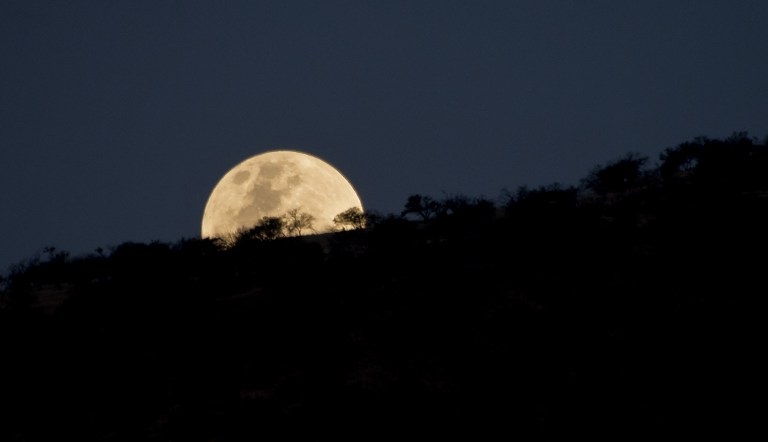
Jakarta, Indonesia | AFP |
Skygazers were heading to high-rise buildings, ancient forts and beaches Monday to witness the closest “supermoon” to Earth in almost seven decades, hoping for dramatic photos and spectacular surf.
The unusually big and bright Moon will appear at its most impressive just as night falls over Asia, but astronomy enthusiasts will be able to see Earth’s satellite loom large anywhere in the world shortly after sunset, weather permitting.
The phenomenon happens when the Moon is full at the same time as, or very near, perigee — its closest point to Earth on an elliptical, monthly orbit. It should appear at its most impressive at 1352 GMT.
It will be the closest to Earth since 1948 at a distance of 356,509 kilometres (221,524 miles), creating what NASA described as “an extra-supermoon”.
The moon will be at its brightest this week as it comes closer to Earth than it has at any time since January 1948. https://t.co/WYmCPHeNaB pic.twitter.com/2c5SNfvGZH
— ABC News (@ABC) November 14, 2016
From India to Australia, skygazers and photographers were seeking the best viewing spots in the region where the phenomenon will be visible first, hoping that cloudy skies and the perennial pollution that blights many Asian cities will not spoil the fun.
Thousands of people were expected to head to Sydney’s Bronte Beach to witness the event after author Gavin McCormack created a Facebook page to let friends know of his plans.
“Bring a flask of tea… bring a picnic, bring the kids and bring your binoculars because this is going to be fantastic,” he wrote.
Delhi residents were hoping toxic smog shrouding the world’s most polluted capital in recent weeks would abate to allow spectacular views as the supsersized moon rises over the Red Fort, the former Mughal emperor’s residence.
Picnics were being organised in downtown Hong Kong for residents to watch the supermoon rise over the financial hub’s famous skyline, while hikers were heading to the greener, more distant corners of the Chinese city to enjoy views with less light pollution.
The landmark Taipei 101 skyscraper in Taiwan, one of the world’s tallest buildings, was set to welcome skygazers, with astronomers predicting it would be one of the biggest moons seen from the island in nearly 100 years.
‘More super than others’
Special viewing events were being organised by astronomy groups, with members of one in Indonesia’s Yogyakarta — the heart of an ancient sultanate — taking to the rooftop of their club headquarters to get a glimpse of the supermoon as it rises over the city’s historic buildings.
Meanwhile, professional astronomers were at the ready at observatories across the region to explain the phenomenon to curious members of the public.
“We are getting students calling in, there are many who want to come,” said Mario Raymundo, head of the Philippine government’s main observatory.
The supermoon will also mean a stronger high tide, something that gets surfers giddy with excitement, not only at the prospect of riding bigger waves, but doing so at night.
Tides were predicted to be higher than usual on the popular Indonesian holiday island of Bali, a favourite with surfers.
In Thailand, astrologers were variously predicting the supermoon would bring disaster or great fortune.
Soraja Nuan-yoo, renowned for predicting the 2004 tsunami that killed many in Thailand and other countries round the Indian Ocean, warned that when the moon gets close to the Earth, “natural disasters happen”.
Astronomers say it can be hard to notice that the Moon appears brighter than usual. Once it is high in the sky, it would be hard to tell the Moon is larger but on the horizon, it could appear quite spectacular.
To get the best view, Pascal Descamps of the Paris Observatory recommended that people choose somewhere with a well-known landmark in the foreground.
Supermoons are actually quite common — there is one every 14 months on average.
“But some supermoons are more super than others,” said Descamps.
 The Independent Uganda: You get the Truth we Pay the Price
The Independent Uganda: You get the Truth we Pay the Price





